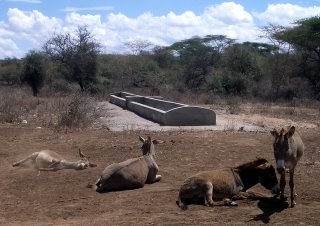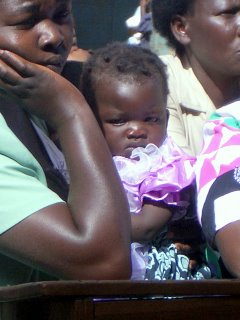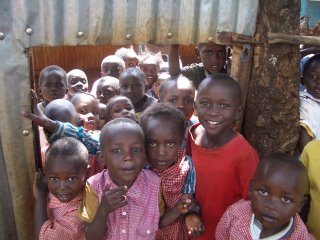
To give you an example of the type of work Church World Service does, I've decided to highlight a project in Kajiado. Kajiado is in Maasai land, between Nairobi and Kilimanjaro. (Kilimanjaro means "shining mountain" in Swahili. "Kili" actually meants "mount", so one should not say "Mount Kilimanjaro.") There was a drought here in 2000-01 that killed much of the livestock. To prevent this from happening again, CWS has sponsored building and rehabilitating numerous sub-surface dams in the area. Essentially, these dams are built by digging into dry riverbeds to serve as water catchments for when it rains. These dams are built large enough so that water is there year-round.

The dams must be managed properly, however, or else they will erode away. Cattle must not walk on the dam itself. A fence is built around some of the dams to prevent contamination by animals, but this restricted access frustrates herders. Also, the waters from each rain wash silt into the dam, necessitating desilting with heavy machinery every 5-7 years. If there is an effective water managing committee, they can charge user fees and spend this money to maintain and improve the dam structure.

TD Jakes came to this area in September, supplying money for a water tank, borehole, troughs, pump and generator. Oftentimes, animals bathing in the dam water make it unsuitable for human drinking. With a borehole and generator to pump water from aquifers below, the Maasai now have ready access to safe water. They will collect user fees for humans and animals, using this money to pay for diesel to run the generator and for needed maintenance repairs .

CWS also encourages communities like this one to use this project as an asset for investing in their own future. For instance, the group has expressed its desire to pipe water to nearby schools. Instead of asking CWS for more money, they will use the excess water pumped from the ground to grow and sell vegetables. In this way, we hope to partner with the community, empowering them to help themselves and others.

















